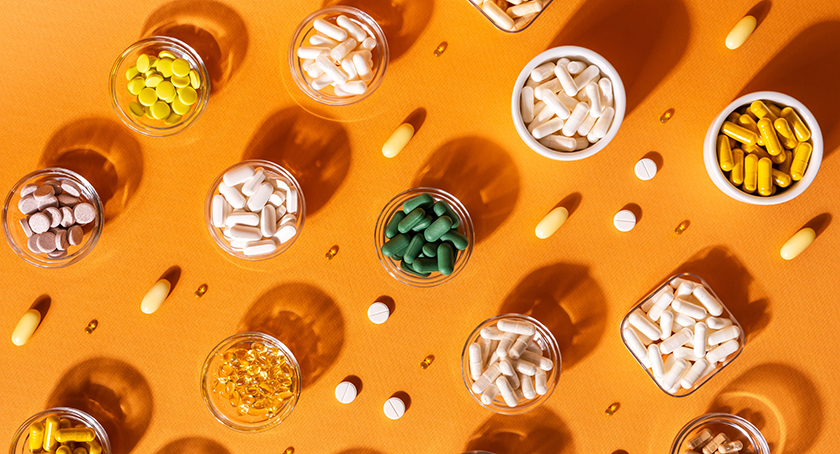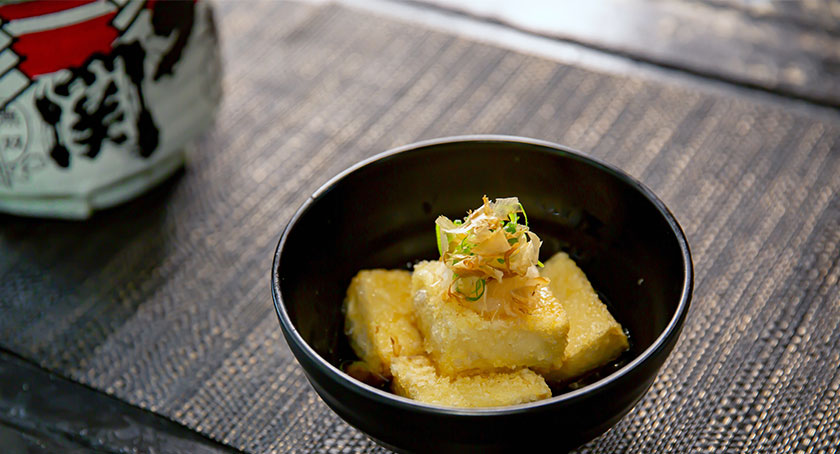Features
Taking the Edge Off, Naturally: Stress Supplements See Mainstream Adoption
Nutraceutical ingredients thought to promote focus and feelings of calm are becoming ubiquitous across multiple market categories.

By: Mike Montemarano

Feeling like you’ve been under pressure lately? You’re not alone.
In the American Psychiatric Association (APA)’s 2024 annual mental health poll, 43% of adults said they experienced greater anxiousness than the previous year, up from 37% in 2023 and 32% in 2022. Americans told APA they were most concerned about current events (70%) like the economy (77%), the 2024 U.S. presidential election (73%), and gun violence (69%). Adults most commonly said that stress (53%) and sleep (40%) had the biggest impact on their mental health.
Gallup reported earlier this year that, for the first time since 2001, a majority of U.S. adults (57%) indicated they’re not sleeping enough, while 42% said they got a satisfactory amount. That’s a near-reversal of 2013 figures when 56% of Americans got the sleep they needed and 43% didn’t.
Over the past three decades, the percentage of people who say they often experience stress in daily life kept crawling upward, with 2023 ringing in an all-time high of 49%, with women (53%) significantly more likely to say so than men (45%).
It’s not just a matter of feeling less rested; Gallup reported substantial declines in actual hours slept. In 2013, 14% of Americans usually slept 5 hours or less per night compared to 34% who slept 8 hours or more. In 2023, one-fifth (20%) of Americans usually slept 5 or fewer hours per night, while only 26% slept 8 or more, on average.
The American Institute of Stress recently estimated that 1 million workers in the U.S. are absent each day because of stress, and job stress costs the U.S. more than $300 billion in losses due to absenteeism, diminished productivity, and accidents, on top of $190 billion in stress-associated healthcare costs.
Consumer Attitudes
More consumers are considering a holistic approach to stress management. Experts note that perceptions about stress support supplements are trending positively.For the first time, stress relief ranked in the top five health benefits shoppers seek out, according to a survey of over 10,000 people completed by Kerry, said Kevin Cencula, senior strategic marketing manager of supplements. The majority of consumers “understand that supplements are just one tool for managing stress, mood, and mental health,” he said. “A comprehensive approach that prioritizes proper nutrition, exercise, and a healthy social life, paired with complementary practices like meditation, can go a long way.”
“One-quarter of global consumers turn to dietary supplements to try improving their sleeping patterns, which is a key aspect of mood and stress,” said Vaughn DuBow, senior director of product portfolio marketing, health and wellness, at ADM. “Thirty-four percent of U.S. consumers like to see cognitive health-related claims in their dietary supplements, up from 20% in 2021. This demonstrates consumers’ increasing focus on this aspect of wellbeing, as well as shoppers having a positive attitude toward utilizing supplements.”
According to Sonali Jagadev, research analyst at Euromonitor International, the most important purchase drivers for stress supplements are strong demonstrations of the efficacy and transparency of a finished product. But personal experiences, recommendations, marketing and social media, and how personalized a supplement is to specific needs can also hold sway, she said.
DuBow said that consumers are looking for a “return to nature” to remedy feelings of stress, which is fueling the growth of botanicals and plant extracts. Guarana, yerba mate, and green tea are booming in the energy drinks segment, for instance, as more adult-oriented products are positioned as focus aids. “Forty-six percent of global consumers state the use of botanicals would increase their consumption of energy drinks,” DuBow said, which inspired the launch of WKUP, a guarana, green tea, and carob extract blend which “may perform comparably to caffeine without common concerns, such as increased heart rate and temporary impact on blood pressure.”
“We also see brands beginning to leverage microbiome-supporting solutions, including prebiotics, postbiotics, and probiotics,” DuBow continued. “Consumers are beginning to make this connection as well. Of the consumers who have used dietary supplements in the last 12 months to try to improve sleeping patterns, 63% state they’re using probiotics.”
Consumers appreciate the level of convenience offered by supplements that can be safely and effectively used in both short- and long-term applications. “Most supplement-based products that have real effects on stress levels can be taken either occasionally or on a regular basis,” said Cal Bewicke, CEO of Ethical Naturals, Inc. “This is one way that they’re different from most drug products. For example, the most recent study on AlphaWave (L-Theanine) showed safety and efficacy were consistent over a 1-year period.”
“There’s a growing understanding among consumers that slowly but steadily reducing stress response improves the ability to sleep as well as stabilize healthy mood,” said Jennifer Clancy, global marketing director of Nutriventia. “Ingredients and products are being launched and directed for long-term use. Traditional herbs are becoming more widely embraced by mainstream consumers as the origin stories help create a narrative that aligns with consumers’ goals.”
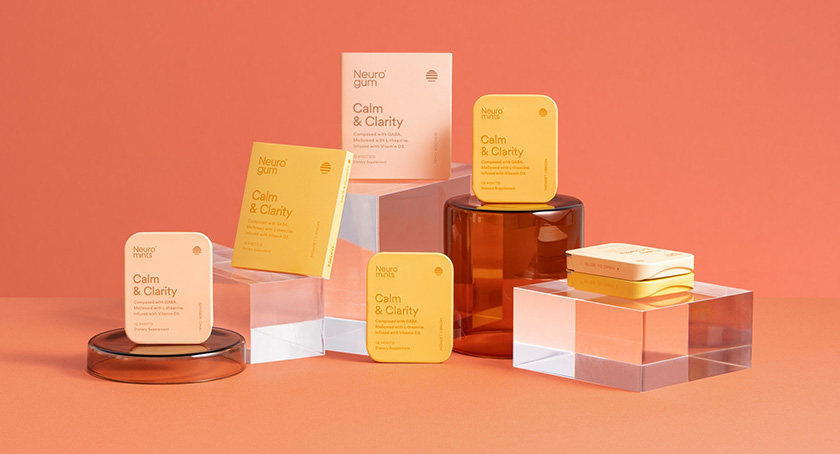
Neuro’s Calm & Clarity Mints feature GABA, vitamin D3, and L-theanine, to ‘optimize composure and clarity of mind.’
Ingredient & Product Trends
According to SPINS, ashwagandha still reigns supreme as the top-selling product in the stress supplement market, even after contracting by -16% to $72 million in sales.SPINS noted that kratom sales grew 137.9% in sales this year to reach $73.1 million. However, the U.S. Food and Drug Administration has maintained that kratom can’t be legally marketed as a dietary supplement.
Over a 1-year period ending in July, trailing ashwagandha in terms of dollar sales, were GABA ($22.8 million, -2.1% from 1 year ago), magnesium ($10.2 million, +13.8%), 5-HTP ($9.3 million, -25.3%), kava ($3.6 million, +125.7%), theanine ($2.6 million, +49.8%), caffeine ($1.9 million, -26%), calcium/magnesium combinations ($1.7 million, +10.7%), and black cohosh ($1.3 million, +26.9%).
“Top growing ingredients across both sales and units include chaga mushrooms, apple cider vinegar supplements, CBD, lavender, and vitamin B,” noted Carly Lang, media relations manager at SPINS.
The mood and stress supplements market is shaking things up when it comes to delivery formats, with gummy and liquid formulas overtaking capsules and tablets in the stress segment over the past year.
The top-performing delivery formats for stress and mood support supplements that SPINS tracked were gummies ($76.1 million, -13.7%), liquids ($70 million, +148.9%), capsules (66 million, -9.8%), tablets ($17.2 million, -9.2%), soft chews ($8.5 million, +74.8%), vegetable capsules ($6.7 million, -5.8%), shots ($6.6 million, +44.3%), softgels ($6.2 million, -12.6%), powders ($2.7 million, +16.2%), and tinctures ($1.5 million, +3.4%).
Some stress-busting products with innovative delivery formats include: Moment, an adaptogenic beverage line available in blueberry ginger, spiced mango, and blood orange ashwagandha flavors; Kowa, a line of beverages containing a combination of 5-HTP, GABA, rhodiola, and ashwagandha available in strawberry yuzu, blackberry hibiscus, and cherry lime flavors; Tru Dream seltzers, which contain chamomile, GABA, and magnesium; Garden of Life’s Stress Relief berry-flavored gummies, which feature rhodiola and saffron; and Neuro’s line of adaptogen-packed, stress-supporting functional chewing gums and mints available in flavors like honey lemon, peppermint, cinnamon, blueberry guava, and passionfruit orange.
According to Bewicke, consumers looking for cognitive health support want products that can provide a non-drowsy soothing effect, along with noticeable mental acuity benefits, sometimes within one single product. They want these benefits to be experiential, hence the popularity of functional food and beverage formats. “This happens in many ways, from soothing and calming herbal teas to products that measurably increase the alpha brainwave levels that are associated with calm but alert states of mind.”
Consumers are also intrigued by ingredients shown to reduce stress by keeping hormone imbalances, inflammation, and oxidative stress in check, hence the popularity of several adaptogens, magnesium, and GABA, according to Jagadev.
Adaptogens, a class of medicinal plants generally defined by their ability to act on the neuroendocrine system to regulate stimulus response, are booming. According to Chanté Wiegand, director of R&D at Pure Synergy, this is leading to broader acceptance of lesser-known medicinal plants, including non-adaptogenic varieties thought to benefit stress more immediately, like saffron and magnolia.
On the supply side, plenty of ingredients have been developed from lesser-known botanicals in this category, such as Gateway Health Alliances’ Somnoril Dichrostachys glomerata extract, PLT Health Solutions’ recently-launched Vanizem Aframomum melegueta extract for stress, and Monteloeder’s RelaxPLX lemon verbena extract.
“Most recent mood and stress support supplement launches now include nootropic ingredients as well to not only support mood but also cognitive function,” said Jagadev.
Some trending products marketed as helpful for retaining cognitive performance while under pressure include Olly’s Plant Powered Focus capsules, which combine ginseng with gotu kola and lemon balm; Life Extension’s Quick Brain Nootropic, which combines gotu kola extract with Bacognize bacopa and Lutemax lutein and zeaxanthin; and Banyan Botanicals’ Tranquil Mind, which combines ashwagandha root, bhringaraj leaf, gotu kola, skullcap, passionflower, and chamomile to support “balance in the nervous system and promote a natural sense of peace.”
Time-release technologies can help supplement manufacturers tailor their products to the occasion, according to Clancy. Nutriventia’s ashwagandha extract, Prolanza, had prolonged availability in blood serum for up to 12 hours, with triple the half-life of competing extracts, and five-times greater relative absorption, she noted. The company’s Melotime melatonin has a unique release profile, where rather than using a simple “sustained release” technology, the first 50% of a dose is released in the first hour, with the subsequent half released more gradually over the sleep window.
“There is growing recognition of the connection between gut health and mental wellbeing, leading to the emergence of gut-brain connection supplements,” Jagadev also noted.
Biohm, for instance, recently launched Gut-Brain Connection under its Essentials line, which features a patented blend of probiotics, Bacopa monnieri, and lion’s mane mushroom to support focus, memory, and stress.
Other gut health products that feature claims about stress include Garden of Life’s Dr. Formulated Mood+ probiotic, which features a mood probiotic blend of Lactobacillus and Bifidobacterium strains, combined with ashwagandha and resistant starch; Bio-K Plus’ new drinkable probiotic, which features three probiotic strains combined with Sensoril ashwagandha; Pure Encapsulations’ ProbioMood supplements, which feature Lactobacillus helveticus Rosell-52 ME and Bifidobacterium longum Rosell-175 for stress, mood, and cognitive support; Gaia Professional Solutions’ GI Stress Blend, featuring gotu kola, jujube, lemon balm, chamomile, and holy basil extracts; and Ancient Nutrition’s SBO Probiotics, which feature a four-strain probiotic blend along with ashwagandha, lion’s mane, apple cider vinegar, and Bacopa to support gut health, mental clarity, concentration, and sleep.
With regular use, adaptogens have been shown to help the body build up greater resilience to stressors over time by reducing cortisol, an important marker of stress, but “when it comes to short-term stress benefits or products for occasional use, we may focus on ingredients shown by research to provide fast results or functionally affect a part of our physiology more quickly,” said Wiegand.
Cencula concurred, noting that it’s becoming more common for supplement manufacturers to combine fast-acting botanicals with those that need to be taken over time, to balance the need for immediate relief with support over the long run. Passionflower or lemon balm, for instance, serve as a suitable pairing for an ingredient like Kerry’s Sensoril ashwagandha, which is associated with benefits after 4 weeks of usage, he said.
Examples of this trend include Ritual’s recent launch of its Stress Relief supplement, which features a three-in-one tablet in capsule technology to provide instant- and extended-release ingredients including Shoden ashwagandha, L-theanine, and Affron, a saffron ingredient studied for mood and stress support benefits.
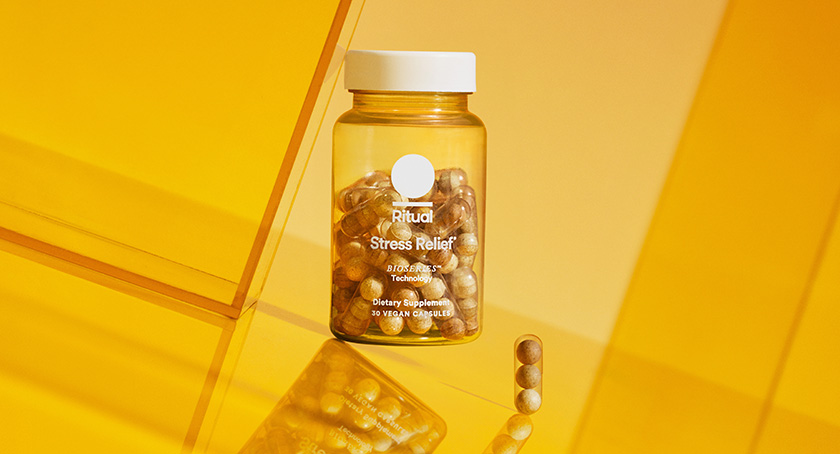
Ritual’s Stress Relief Formula features a mix of instant- and extended-release botanicals to balance the need for immediate effects with long-term support.
Worldwide, the dietary supplements industry is acknowledging the long-overlooked consumer base of women experiencing menopause, a phase of life characterized by chronic stress and mood disruptions that can last years, brought on by steep drop-offs in estrogen levels.
Hum Nutrition’s Fan Club supplements combine Siberian rhubarb extract, which has been shown to support many of the physiological aspects of menopause, with a patented probiotic strain associated with mood benefits, and a grape seed extract formulated for stress support.
Meanwhile, Centrum’s Clear Mind and Calm Mood Menopause Support Tablets claim to support mental alertness, attention, focus, and calm, and contain enXtra Alpinia galanga extract, KSM-66 ashwagandha, and vitamin B6. Pure Encapsulations’ MenoVive supplements include rhodiola with other herbal extracts formulated for healthy hormonal balance, heart function, and sexual wellness.
The sports nutrition scene is also interested in supporting mental acuity under stress at game time, and supporting relaxation during recovery. Plenty of recovery products are looking beyond just aching joints and muscles and include other ingredients to provide a sense of calm and focus.
For instance, Roundhouse Provisions, a sports nutrition brand backed by Chuck Norris, recently launched Morning Kick, a formula featuring a greens blend, pre- and probiotics, collagen peptides, and ashwagandha, with claims that the drink may support healthy digestion, energy levels, overall wellness, and stress.
Cheribundi launched a new line of tart cherry gummies that are formulated to help support recovery, with a Sleep variety that includes melatonin and ashwagandha root. Transparent Labs’ Sleep Aid and Recover post-workout supplements combine muscle recovery ingredients with those that can provide a sense of calm, including magnesium bisglycinate, and L-theanine. Onnit’s Shroom Tech Sport supplements, which feature vitamin B12, cordyceps, ashwagandha, green tea, and rhodiola extracts, are adaptogen-packed and marketed specifically for workout performance. According to the company, the supplements resulted in greater exercise performance improvements than placebo over the course of a 12-week treatment period in an unpublished Florida State University study.
On the supply side, PLT Health Solutions’ Zynamite PX was tested in a clinical study that evaluated how a single dose could impact the performance of top Greek national basketball players during an exercise simulation test.
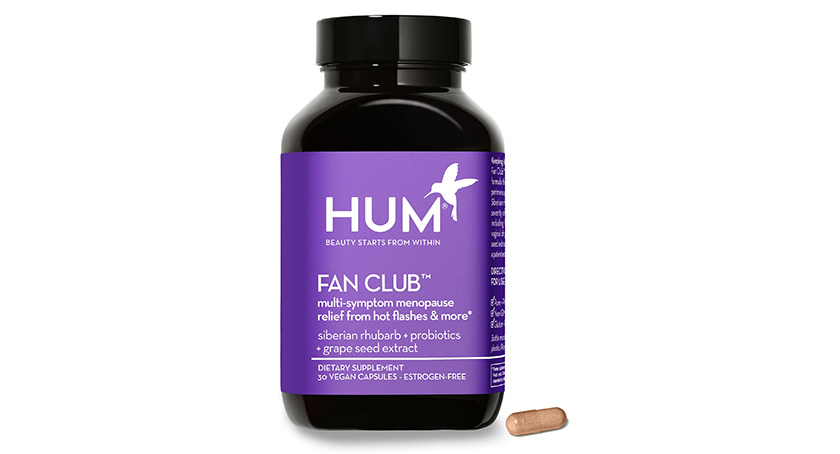
Hum Nutrition’s Fan Club features a botanical blend formulated specifically for menopause.
Emerging Research
According to Cencula, many brands are supporting research to back claims with “greater precision on the benefit being delivered,” by focusing on biomarkers rather than subjective measures of stress.One of the top targets in researching stress supplements today is a reduction in cortisol. “Many brands have started to speak specifically to helping manage, balance, or regulate cortisol levels in the body, which has pervasive effects for cognitive health, cardiovascular health, and aging,” Cencula said. Ashwagandha ingredients, including Sensoril per a 2019 study, are associated with significant reductions in cortisol that seem to line up with reductions in self-reported stress in adults who report elevated stress levels at baseline.
A triple-blind, placebo-controlled, crossover study on AlphaWave L-theanine evaluated the effects of a single dose on EEG, salivary cortisol, blood pressure, heart rate, and self-reported stress, after stress was induced through a mental arithmetic test. “It’s a type of validated benefit that brings focus and popularity to a range of stress relief ingredients,” Bewicke concurred.
Results such as these are important given how easily stress- and mood-related claims can land a company in hot water with the FDA. “Due to regulatory constraints, the key to creating health claims is to find wording that connects to our consumers and can be validated by science, but that doesn’t over-compromise and exceed FDA boundaries,” said Wiegand.
Some companies choose to make claims around “anxiety” and “depression” anyway, which can create an uneven playing field, he added. “Consumers assume their products are more effective than others on the market, but really, they’re just being misled. Competing with brands that hold looser ethics in this way is very difficult when trying to establish mood and stress supplement market share.”
Still, some investors view serious stress-related conditions as an important white space for nutrition. HedoniaUSA, a newly-formed mental wellness company, is developing a medical food intended to address the unique nutritional needs associated with depression.
“I’m dedicated to finding solutions to anxiety and mood disorders through nutraceutical psychopharmacology,” said Jerome Sarris, PhD, board member and executive director at Psychae Institute. “When I discovered Hedonia’s science-backed mission to rebalance the brain through a nutrient-based, real-food product, it felt natural to get involved.”
The company launched a formulation of EPA, L-methylfolate, and SAMe, and received patents in 2013 and 2017 as a nutritional tool for the dietary management of depressive disorders.
A study by Ohio State University researchers found that chronic stress, via associated chronic inflammation, played a substantial role as a risk factor for metabolic syndrome. Little research prior to this study laid out data on how stress-modulated inflammatory patterns could result directly in metabolic syndrome, but in this study, which recruited 648 participants, those who had higher self-reported stress levels tended to have higher concentrations of inflammatory biomarkers, and were more likely to be at risk for metabolic syndrome in physical examinations.
Research on the interplay between the gut microbiome and mental wellness, via the gut-brain axis, continues to move at a faster pace. A study published in Nature Mental Health analyzed how certain microorganisms, as well as how their genes are expressed, can relate to overall patterns of psychological resilience, as measured by questionnaires and brain imaging. In the 116 adults without a mental health diagnosis who participated, those more resilient to stress had greater levels of anti-inflammatory activity in the gut microbiome, and greater measures of gut barrier integrity. The findings suggest that “the microbiome is critical in shaping resilience, and … microbiome modifications can optimize mental health,” the authors concluded. “Resilient individuals, particularly those demonstrating tenacity and perceived ability to control life outcomes, possess a microbiome that supports gut barrier integrity and eubiosis.”
About the Author: Mike Montemarano has been the associate editor of Nutraceuticals World since 2020. He can be reached at mmontemarano@rodmanmedia.com.








